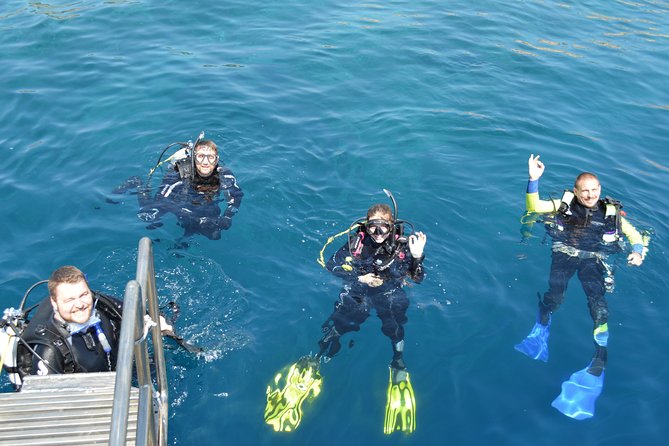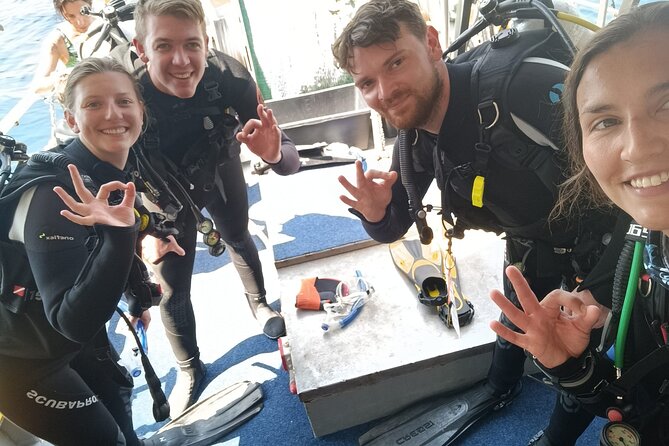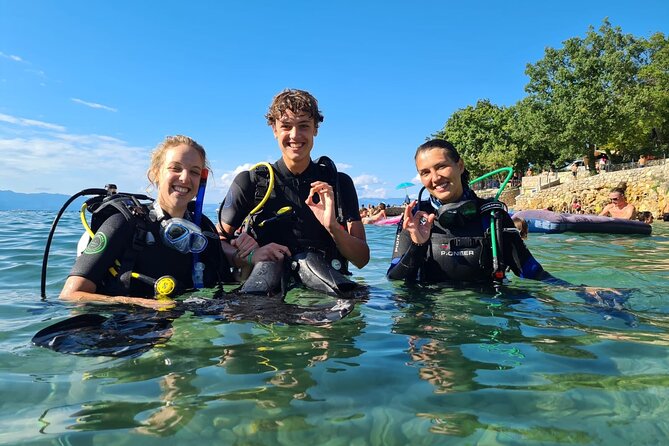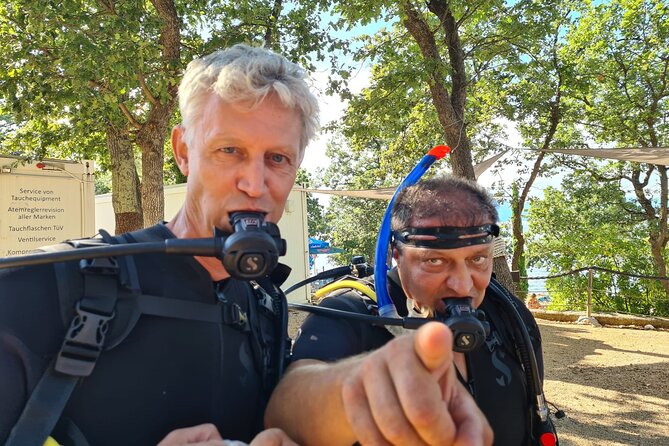Open Water Diver
Have you ever wondered what lies beneath the surface of the ocean, waiting to be discovered?
The journey to becoming an Open Water Diver unveils a world of wonder and excitement, where you can explore the ocean’s depths in a whole new light.
From the initial plunge into training to the exhilarating feeling of breathing underwater, the Open Water Diver certification offers a gateway to a realm filled with endless opportunities for exploration and adventure.
Stay tuned to learn more about the transformative experience that awaits those who take the plunge into this captivating underwater world.
Key Points

- Open Water Diver certification enables independent exploration of diverse underwater environments.
- Essential equipment includes mask, fins, regulator, and BCD for safety and enjoyable diving experiences.
- Safety guidelines emphasize diving with a buddy, proper equipment maintenance, and emergency procedure familiarity.
- Popular dive sites like Blue Hole, Great Barrier Reef, Maldives, and Cozumel offer unique marine experiences.
Benefits of Open Water Diver Certification

Becoming a certified Open Water Diver opens up a world of underwater exploration and adventure for enthusiasts of all levels of experience. The benefits of Open Water Diver certification are immense.
Certification allows divers to dive independently without professional supervision, providing a sense of freedom and self-reliance. It also opens doors to dive in some of the most beautiful and diverse underwater environments around the globe. With certification, divers gain access to dive shops, rental equipment, and organized dive excursions.
Plus, being a certified Open Water Diver enhances safety by ensuring that individuals understand essential diving principles and techniques. The certification process not only enriches the diving experience but also promotes responsible diving practices.
Training Requirements for Open Water Diver

To become an Open Water Diver, individuals must complete a comprehensive training program that covers essential diving skills and safety procedures. This training ensures that divers are equipped with the knowledge and abilities necessary to explore the underwater world safely. The program typically includes both theoretical knowledge, such as dive theory, and practical skills, like mastering buoyancy control and underwater navigation. Below is a table illustrating some of the key training requirements for Open Water Diver certification:
| Training Requirements | Description | Importance |
|---|---|---|
| Dive Theory | Understanding physics of diving | Essential |
| Dive Skills | Practicing buoyancy control | Fundamental |
| Safety Procedures | Learning emergency protocols | Crucial |
Equipment Needed for Open Water Diver
When embarking on the journey to become an Open Water Diver, essential equipment becomes your ticket to exploring the depths of the underwater world.
Gear essentials for Open Water Divers typically include a mask, snorkel, fins, wetsuit, regulator, buoyancy control device (BCD), dive computer, and weights.
It’s crucial to ensure that all gear fits properly and is in good working condition. Maintenance tips such as rinsing equipment with fresh water after each dive to remove salt and sand, storing gear away from direct sunlight, and regularly inspecting for any signs of wear or damage are essential for prolonging the lifespan of your diving equipment.
Properly cared for gear not only enhances safety but also contributes to a more enjoyable diving experience.
Safety Tips for Open Water Diver
Exploring the underwater world as an Open Water Diver requires a keen awareness of safety measures to ensure a thrilling yet secure diving experience. Safety tips are crucial for every diver to abide by.
Firstly, always dive with a buddy to have someone to rely on in case of emergencies. Check your equipment before each dive to ensure it’s functioning correctly. Maintain proper buoyancy control to prevent accidents and protect marine life. Be aware of your surroundings and never touch or disturb underwater creatures.
Familiarize yourself with emergency procedures and practice them regularly. Lastly, stay within your limits and never push yourself beyond your comfort level. Adhering to these safety tips will help guarantee a safe and enjoyable diving adventure.
Popular Dive Sites for Open Water Diver
Discover the enchanting depths of the ocean at some of the most sought-after dive sites for Open Water Divers. Below are some recommendations for popular dive sites where Open Water Divers can explore the wonders of the underwater world:
| Dive Site | Location | Highlights |
|---|---|---|
| Blue Hole | Belize | Stunning underwater sinkhole |
| Great Barrier Reef | Australia | World’s largest coral reef system |
| Maldives | Maldives | Pristine waters and diverse marine life |
| Cozumel | Mexico | Vibrant coral reefs and marine species |
| Maui | Hawaii | Turtle encounters and volcanic formations |
Open Water Divers can benefit from visiting these sites to witness diverse marine ecosystems and enhance their skills with unique underwater experiences. These locations offer a range of depths and marine life, perfect for divers of all certification levels.
Dive Planning and Logistics

Set out on a journey of meticulous planning and seamless coordination for an unforgettable diving experience as you explore the intricate world of Dive Planning and Logistics.
When preparing for a dive, it’s crucial to follow the dive buddy system, ensuring that you and your partner look out for each other underwater. Dive computers play a vital role in monitoring your dive profile and bottom time, enhancing safety and enjoyment.
Understanding underwater navigation techniques is essential to navigate the depths effectively. Plus, familiarizing yourself with dive flag regulations is crucial for signaling your presence to surface watercraft.
Environmental Awareness for Divers
Developing a heightened environmental consciousness is pivotal for divers to actively preserve and protect the underwater ecosystems they explore. Marine conservation should be at the forefront of every diver’s mind, striving to minimize their impact on delicate marine environments.
Sustainable diving practices, such as proper buoyancy control to prevent damage to coral reefs, and avoiding contact with marine life, are essential. Divers must also be mindful of their waste, ensuring no trash is left behind and being cautious not to disturb the natural habitat.
Continuing Education Opportunities
Exploring further educational opportunities in diving enhances skills and knowledge for a more enriching underwater experience. Divers can pursue various certification options and advancements to deepen their expertise. Specialized skills and specialties can open up new horizons in the underwater world, allowing divers to explore specific interests or environments. Below is a table highlighting some common continuing education opportunities in diving:
| Certification Options | Advancements | Specialized Skills | Specialties |
|---|---|---|---|
| Advanced Open Water | Rescue Diver | Deep Diver | Wreck Diver |
| Enriched Air Nitrox | Dive Master | Underwater Imaging | Night Diver |
| Underwater Navigation | Divemaster | Search and Recovery | Drift Diver |
| Peak Performance Buoyancy | Technical Diving | Marine Conservation | Ice Diver |
Common questions
Can I Participate in the Open Water Diver Certification if I Have a Fear of Open Water or Deep Water?
Overcoming fears and mental preparation are essential for managing anxiety related to open or deep water. Relaxation techniques can help participants build confidence and face their fears. Proper guidance and support are crucial.
Are There Any Age Restrictions for Obtaining an Open Water Diver Certification?
Age requirements for obtaining a diver certification vary, typically starting at 10-12 years old with parental consent. Training includes theory, confined water practice, and open water dives. Equipment needs include a mask, fins, regulator, buoyancy device, and exposure suit.
How Long Does It Typically Take to Complete the Open Water Diver Certification Process?
The time to complete a certification varies based on skill requirements. It typically takes individuals several weeks to finish the process successfully. Emphasizing practice, dedication, and learning is crucial for mastering the necessary skills.
Is Previous Swimming Experience Required to Become a Certified Open Water Diver?
Swimming experience is highly recommended for safety precautions and comfort in the water. It aids in skill development and mastery of training techniques. Equipment familiarity and confidence are crucial for a successful certification process.
Are There Any Medical Conditions That Would Prevent Someone From Becoming Certified as an Open Water Diver?
Certain medical conditions may prevent individuals from becoming certified as divers. Pre-certification screenings assess fitness for diving. Diving contraindications like ear or sinus issues, respiratory conditions, and heart problems may require medical exemptions. Fitness evaluations are crucial.
Last Words
Experience the thrill of exploring the underwater world as an Open Water Diver. With essential skills, knowledge, and safety tips, this certification opens up a whole new realm of adventure.
Dive into the mesmerizing beauty of the ocean depths, discover incredible marine life, and explore popular dive sites. Remember to stay environmentally aware and always continue your education to enhance your diving experience.
The world beneath the surface awaits – dive in and be amazed!